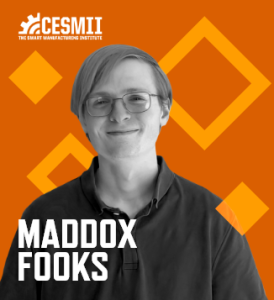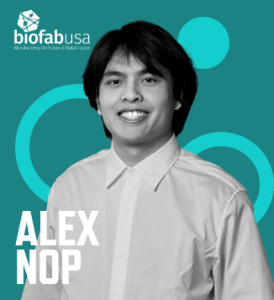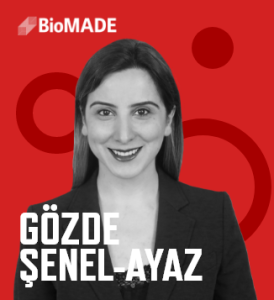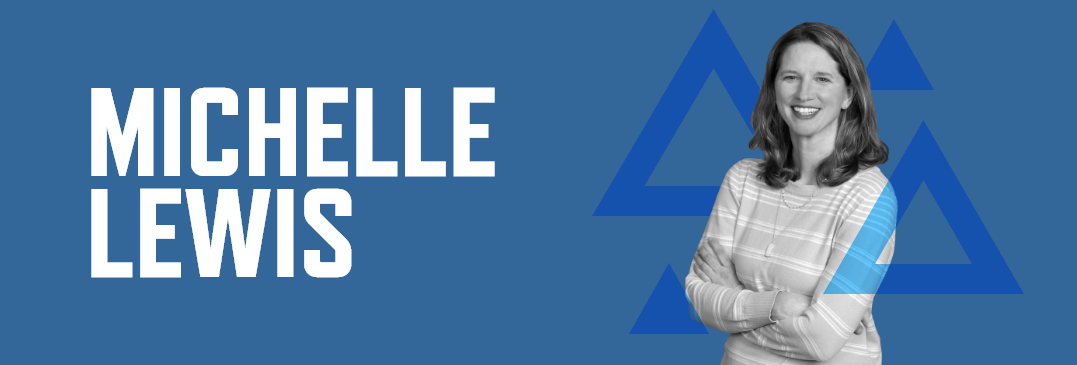
Biomanufacturing Expert, Career Shaper, Hiker
Michelle Lewis is a leader in biopharmaceutical education and training. Currently serving as the Executive Director of the Stack Family Center for Biopharmaceutical Education and Training (CBET) at Albany College of Pharmacy and Health Sciences (ACPHS), an NIIMBL member, she is shaping the future of biomanufacturing. In her role, she drives the development of educational programs that equip the next generation of professionals with the skills needed in the rapidly evolving biopharmaceutical industry.
With a background in biochemistry and molecular biology, Michelle has an extensive career that spans both academic and industrial settings. After completing her Ph.D., she honed her expertise through postdoctoral work at Johnson & Johnson and roles at Vanderbilt University and the University of Georgia. These experiences helped her understand the critical connection between research, development, and real-world applications in biomanufacturing.
As Executive Director of ACPHS CBET, Michelle plays an active leadership role in supporting the Master’s and Bachelor’s of Biotechnology degree programs, continuing education courses, and a wide range of training opportunities for industry professionals. Through strategic engagement with partners in academia, government, and the private sector, she helps align CBET’s initiatives with the forefront of biomanufacturing and workforce development trends.
Her leadership extends beyond program development. Michelle Lewis has been a key player in the NIIMBL eXperience, an initiative that strengthens talent pipelines by introducing students to the biopharmaceutical industry. Through her vision and dedication, CBET has become a hub for innovation and workforce development, empowering both students and industry professionals to advance in their careers. For these reasons, Michelle Lewis is a Modern Maker.
Q&A with Michelle
How did you find your way to working in Advanced Manufacturing?
I didn’t start out thinking I’d end up in advanced manufacturing, but I’ve always been drawn to roles that sit at the intersection of education and innovation. My path started in higher education, where I worked on building scientific programs for drug discovery. Over time, I saw how advanced manufacturing—especially in the biopharmaceutical sector—was transforming the world around us and opening up incredible career paths for people.
What really pulled me in was the impact: this field is not just about machines and technology—it’s about creating life-saving therapies, building sustainable solutions, and helping people. That mission clicked with me.
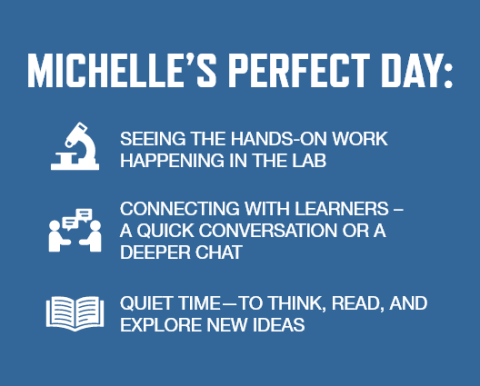
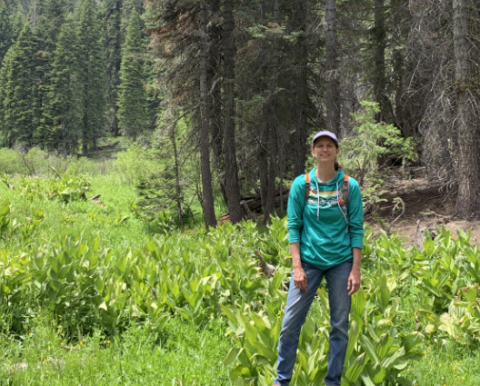
What is the most challenging part of your job?
One of the most challenging parts of my job is balancing the long-term vision with the day-to-day realities. As Executive Director of CBET, I’m constantly thinking about how to position the center for future growth—what partnerships we should build, what skills the workforce will need five years from now, how to stay ahead of industry trends. At the same time, I need to make sure the team has what they need today to deliver high-quality training and research, manage operations, and meet immediate goals.
It can be tough to shift between the big picture and the small details, especially in a field as fast-moving as advanced biomanufacturing. But it’s also what makes the job exciting. That constant challenge keeps me learning, keeps me agile, and reminds me that meaningful progress happens one thoughtful step at a time.
What is the best part of your job?
The best part of my job is seeing people succeed—whether it’s a student gaining confidence in the lab, a mid-career professional landing a new role in the industry, or a partner organization telling us how our training made a real difference. Those moments are incredibly fulfilling.
CBET is all about creating pathways—into meaningful work, into innovation, and into the future of biopharmaceutical manufacturing. Knowing that we’re not just teaching skills, but helping people transform their lives and communities, is what keeps me inspired every day.
It’s also a privilege to work in a space that blends science, education, and industry. There’s always something new to learn, and I’m surrounded by passionate people who care deeply about making an impact.
What would people be surprised to learn about manufacturing or your role in manufacturing?
People are often surprised to learn how human-centered advanced manufacturing really is—especially in biopharmaceuticals. There’s a misconception that manufacturing is all machines and automation, but at CBET and in the broader industry, it’s really about people: their skills, their decisions, their ability to innovate and problem-solve in real time. It takes a highly trained, highly engaged workforce to bring a therapy from concept to production—and that’s where education and training become mission-critical.
As for my role, many don’t realize how much of it involves collaboration and vision-setting. Yes, we’re focused on technical training, but I also spend a lot of time building partnerships, securing funding, advocating for workforce development, and thinking about how we make this field more accessible and inclusive. Manufacturing today isn’t just about production—it’s about creating systems and opportunities that move entire industries forward.
What advice do you have for someone new to the industry or considering manufacturing as a career?
My advice for someone new to the industry—or even just considering it—is: don’t underestimate the opportunities in manufacturing. It’s not what it used to be. Today’s manufacturing, especially in biopharma, is high-tech, fast-moving, and deeply impactful. You could be working on the next life-saving therapy or helping build more sustainable, efficient systems for the future.
Also, you don’t have to have a traditional background to get started. There are so many entry points—from hands-on training programs to certifications to on-the-job learning. Be open, be curious, and don’t be afraid to ask questions or try something outside your comfort zone.
And finally, find a mentor or a network—people who can help you see what’s possible. The industry is full of people who want to lift others up. You don’t have to do it alone.
What makes you excited to go to work on Mondays?
What gets me excited to go to work on Mondays is the sense that what we’re doing matters. Every week brings new opportunities to solve problems, spark ideas, and connect people with careers that can truly change lives. Whether it’s launching a new training initiative, welcoming a new cohort of students, or collaborating with industry partners on emerging technologies, there’s always something meaningful in motion.
I also love that no two Mondays are the same. The work is dynamic, the field is constantly evolving, and I get to be part of a team that’s passionate, driven, and committed to impact. The team's energy is contagious—and it’s what keeps me looking forward to the start of each week.
I’m fortunate to be a part of such a smart, passionate team that’s always moving things forward. Every week, I get to tap into their insights—hearing updates from the lab, learning what’s working (or not), and rolling up our sleeves to solve problems together. Those conversations often spark new, visionary ideas that help shape the future of ACPHS CBET.
What are the three most important skills for your job?
The three most important skills for my job are collaboration, adaptability, and resilience.
Collaboration is essential because nothing we do at ACPHS CBET happens in a vacuum. We work across departments, industries, and communities—so building strong relationships and aligning around shared goals is what drives real, sustainable progress.
Adaptability is critical in a space like advanced manufacturing, where technology evolves quickly and workforce needs are constantly shifting. Being open to change and able to pivot with purpose helps us stay ahead of the curve and meet the moment.
And resilience—that’s the glue that holds it all together. Science and workforce development are inherently challenging. Progress doesn’t always happen in a straight line—setbacks, failed experiments, and unexpected hurdles are part of the process. Resilience means staying focused, learning from those moments, and continuing to push forward with clarity and purpose. It’s what allows innovation to happen and growth to continue, even when things get tough.
If you didn’t have to work, how would you spend your day?
If I didn’t have to work, I’d keep the day simple and restorative. I’d start with a slow morning, maybe sitting outside with a cup of tea and a good book. I’d take a midday nap—because when do we ever get to do that?—and spend the rest of the afternoon soaking up the sunshine, reading, or just enjoying the quiet. No schedule, no rush—just time to reset, reflect, and be fully present in the moment.
What activity gives you the most energy?
Spending time outside with my children gives me the most energy—especially when we’re hiking or exploring somewhere new. There’s something about being in motion, surrounded by trees, and fresh air that completely recharges me. It’s joyful, grounding, and often full of spontaneous little adventures that leave me feeling more alive and connected.
What hobbies make you better at your career?
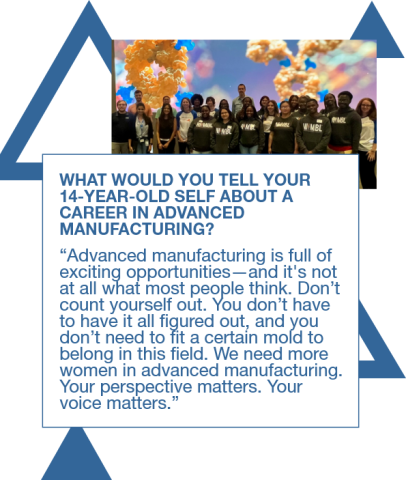
Two of my favorite hobbies—reading popular fiction and hiking—both make me better at my career in meaningful ways.
Reading fiction allows me to step into different worlds and see life through other people’s eyes. It helps me build empathy, understand diverse perspectives, and connect more easily with others—whether it’s students, colleagues, or partners.
Hiking gives me space to think, reflect, and reset. Being out in nature helps me clear my head and often sparks new ideas or solutions to challenges I’ve been working through. It’s where I do some of my best thinking—and return to work feeling focused and energized.
How does the work you do impact the world?
At ACPHS CBET, the work we do has a real and lasting impact—both on individual lives and on the broader biopharmaceutical industry. We’re training the next generation of skilled professionals who will help manufacture life-saving therapies, and at the same time, we’re partnering with companies through our research services to solve real-world challenges and accelerate innovation.
It’s incredibly rewarding to know that our efforts support not only workforce development, but also the advancement of cutting-edge science. Whether we’re helping someone launch a new career or assisting a company in scaling up a process, we’re playing a role in improving health outcomes and strengthening the industry as a whole.


